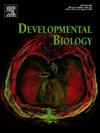肾元祖细胞中的Rac1对肾脏发育至关重要。
IF 2.1
3区 生物学
Q2 DEVELOPMENTAL BIOLOGY
引用次数: 0
摘要
肾发育不全是一种常见的先天性疾病,其特征是肾脏异常小,肾单位数量减少。在胚胎发育过程中,肾元的形成依赖于肾元祖细胞(npc)与周围上皮和间质组织的反复相互作用,这一过程受到遗传因素的严格调控。由于npc的自我更新和多能性,它们对肾脏的发育至关重要。Rac1是一个小的GTPase,它的突变与发育和疾病的多个事件有关。虽然异常的Rac1活性与各种肾脏疾病有关,但其在npc中的作用仍不清楚。在这项研究中,我们在npc中建立了组织特异性的Rac1敲除模型。我们的数据表明,缺乏Rac1会破坏细胞周期进程并降低细胞增殖率。因此,Rac1条件敲除肾表现出较少的npc和新生肾单位,导致发育不良表型。通过qPCR和免疫染色,我们进一步发现在rac1缺失的npc和体内模型中JNK信号活性下调。相反,在NPC中表达一种自激活形式的Rac1 (Rac1G12V)会增加每个输尿管芽的NPC数量,并增强细胞增殖,同时伴有JNK信号的上调。我们得出结论,Rac1可能通过JNK信号通路在维持NPC增殖和自我更新中发挥关键作用。本文章由计算机程序翻译,如有差异,请以英文原文为准。
Rac1 in nephron progenitor cells is essential for kidney development
Renal hypoplasia is a common congenital condition characterized by abnormally small kidneys with a reduced number of nephrons. During embryonic development, nephron formation relies on repetitive interactions between nephron progenitor cells (NPCs) and surrounding epithelial and stromal tissue, a process tightly regulated by genetic factors. NPCs are crucial to kidney development due to their self-renewal and multipotent abilities. Rac1 is a small GTPase and its mutation is implicated in multiple events of development and disease. While aberrant Rac1 activity has been linked to various kidney diseases, its role in NPCs remains unclear. In this study, we generated tissue-specific Rac1 knockout models in NPCs. Our data demonstrate that Rac1 deficiency disrupts cell cycle progression and reduces cell proliferation rates. Consequently, Rac1 conditional knockout kidneys exhibit fewer NPCs and nascent nephrons, resulting in a hypoplastic phenotype. Using qPCR and immunostaining, we further show that JNK signaling activity is downregulated in both Rac1-deficient NPCs and in vivo models. Conversely, expression of an autoactivated form of Rac1 (Rac1G12V) in NPCs increases NPC numbers per ureteric bud and enhances cell proliferation, accompanied by upregulated JNK signaling. We conclude that Rac1 plays a critical role in maintaining NPC proliferation and self-renewal, likely through the JNK signaling pathway.
求助全文
通过发布文献求助,成功后即可免费获取论文全文。
去求助
来源期刊

Developmental biology
生物-发育生物学
CiteScore
5.30
自引率
3.70%
发文量
182
审稿时长
1.5 months
期刊介绍:
Developmental Biology (DB) publishes original research on mechanisms of development, differentiation, and growth in animals and plants at the molecular, cellular, genetic and evolutionary levels. Areas of particular emphasis include transcriptional control mechanisms, embryonic patterning, cell-cell interactions, growth factors and signal transduction, and regulatory hierarchies in developing plants and animals.
 求助内容:
求助内容: 应助结果提醒方式:
应助结果提醒方式:


